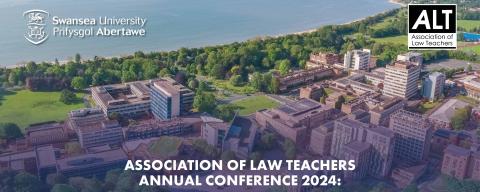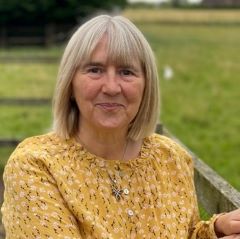Reflections on the Annual Association of Law Teachers Conference: Learning, Networking, and Coastal Charms

The Annual Association of Law Teachers Conference is always an enjoyable event providing delegates with the opportunity to meet with other likeminded individuals and discuss all things legal pedagogical.
This year the conference had the added bonus of being at Prifysgol Abertawe (Swansea University), which is close to the lovely beaches of south Wales. With a hotel within reasonable walking distance of the venue I imagined lovely coastal walks each morning, but the Welsh weather had other ideas!
Traveling from Yorkshire meant a long train journey, but I was fortunate to run into a former colleague at Manchester station and we were able to share updates whilst on the journey to Swansea. As a few Open University colleagues were traveling down the day before, we were able to meet up for an evening meal and enjoy good company.
The conference started off with two very interesting keynote speakers. Firstly, Sadie Whittam (Lancaster University) talked about her work relating to authentic assessment. Sadie identified that this educational buzzword had no universal definition but basically, she was referring to assessments that are grounded in real life, what would be done in the employment field, providing students with the opportunity to demonstrate they “can do” rather than “they know”. This resonated with me. At the recent Open University (OU) Law School Equality Diversity and Inclusion Competition one of the student finalists had discussed the idea of assessment relating to employment – he talked about authentic assessment, even if he did not use the term. This kind of assessment empowers students, allowing them to develop and demonstrate key employability skills, so essential for the competitive legal job market many will be entering. At times, there seems to be a perceived debate between traditional assessment and authentic assessment. However, in reality, these two approaches can actually complement each other, offering students a more enriched assessment experience. Sadie concluded her presentation with some top tips for incorporating authentic assessment into the curriculum. For me, the key message was authentic assessment requires authentic learning and this must be scaffolded to ensure student success.
The second keynote was Dr Michele Leering from Queens University, Canada and her presentation focused on reflective practice. She argued that reflective practice should be valued; that we can only build professional knowledge through reflection and reflection is a powerful learning tool. Reflective practice is one of the QAA benchmarks for legal students’ employability skills, yet so many of our students engage with this superficially or not at all. This left me thinking how can we get students to engage more with reflection?
 Later in the conference Michele along with Professor Emeritus Nigel Duncan and Dr Emma Jones (University of Sheffield) ran a world café style workshop entitled Promising Pedagogy: Choose your own adventure. Here delegates were given the opportunity to share good practice and discuss how students could be encouraged to develop their own capacity for integrative reflective practice. The world café as a teaching tool was brilliant and provided the opportunity to hear all delegates ideas and experiences in a relaxed informal environment. The process was enhanced by the inclusion of flowers on the table and the odd chocolate which just created a different ambience.
Later in the conference Michele along with Professor Emeritus Nigel Duncan and Dr Emma Jones (University of Sheffield) ran a world café style workshop entitled Promising Pedagogy: Choose your own adventure. Here delegates were given the opportunity to share good practice and discuss how students could be encouraged to develop their own capacity for integrative reflective practice. The world café as a teaching tool was brilliant and provided the opportunity to hear all delegates ideas and experiences in a relaxed informal environment. The process was enhanced by the inclusion of flowers on the table and the odd chocolate which just created a different ambience.
Another session which held particular interest for me was Flipping IRAC [1] with FORTITUDE delivered by Professor Dawn Watkins (University of Sheffield). IRAC is a real problem area for many of my year one and two students.They find it extremely challenging and, just as Dawn suggested, for most students the issue is the rule. Dawn suggested that if you teach these skills by first removing the rule and getting the students to identify the issue, apply and then conclude, you can then show them how to add the rule to enhance their marks. I can’t wait to try this out with my own students! Dr Jenny Kemp (Leicester University) presented on Law-specific Words on LLM Reading. She had us all doing little exercises that really brought home the confusion English can cause when studying with English as a second language. This again gave me ideas that I hope to incorporate in my own work.

The conference concluded with a presentation from the Right Hon Lord Lloyd-Jones, Justice of the Supreme Court who arrived just before lunch and made a concerted effort to meet all delegates and have a chat about their work. Lord Lloyd-Jones in his presentation argued the case for International Law providing many fascinating examples of its impact. He ended by urging for its inclusion in the law degree curriculum.
The conference is more than presentations, it provided an opportunity to meet face-to-face with colleagues from both the OU and other institutions. The conference dinner was an excellent opportunity to exchange news and share ideas. And the sun came out on the afternoon of the last day, which provided the opportunity for a walk and an ice cream at a wonderful ice cream parlour. I'll stay silent on the train journey back, but I felt a wave of relief when I finally spotted my home station, it was good to be home.
[1] Law problem solving tool – Issue, Rule, Application Conclusion
Image sources ©CJE 2024

Carol Edwards
Carol is a Senior Lecturer within the Law School. She joined the OU as an Associate Lecturer in 2015 and became a Student Experience Manager in 2018 before taking up the role of Assistant Head of Student Experience – Retention and Outcomes in 2023. She is a Senior Fellow of the HEA. Carol’s research interests include online teaching pedagogy with a particular focus on tackling student and staff isolation in the distance learning environment via such programmes as online student peer mentoring, The Belonging Project and Tutor CPD and social programmes. She has published and presented at conferences on this area.